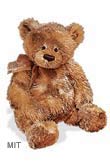Bear Hug: New Robot to be Therapeutic Companion

Huggable, a robotic companion for therapeutic applications, is the result of an MIT project that seeks to take advantage of our love for animals. Research indicates that animal companionship benefits people; they can lower our stress, reduce heart rate and respiratory rate, elevate mood and facilitate greater socialization with other people.
However, there are many situations where animals are not welcome, due to allergies, risk of disease or institutional requirements (in hospitals and nursing homes).
The MIT team has created a huggable robotic bear based on Gund toy bears that can interact with patients and provide quantitative information to care givers.
The Huggable robotic therapeutic companion makes use of a variety of cutting-edge technologies:
- The full-body sensate skin consists of three different types of sensors - electric field, temperature and force - that cover the entire surface of the robot. (The sensor-skin lies under a silicone skin and plush fur fabric for greater comfort.) This may be an improvement over earlier efforts to give robots pressure-sensitive skin or electroluminescent thin film sensors.
- An inertial measurement unit, cameras embedded in the eyes and microphones in the ears.
- Voice coil actuators with position sensing give the Huggable silent, compliant and backlash-free movement in the neck, shoulders and face.
- An embedded PC with wireless communication capabilities implements the robots behaviors and provides care givers with effective patient monitoring and efficient data collection.
Researchers are determined to meld these technologies into a coherent whole that serves patient needs:
"One important and novel capability we are developing for the Huggable is its ability to participate in active relational and affective touch-based interactions with a person. Social-relational touch interactions play a particularly important role for companion animals in their ability to provide health benefits to people... To be effective, therapeutic robotic companions must also be able to understand and appropriately respond to how a person touches it ."
Science fiction fans have been looking forward to these developments for generations. In his 1969 story "Super-Toys Last All Summer Long" (the basis for Steven Spielberg's "A.I."), writer Brian Aldiss imagines Teddy, a perfect robotic companion for a young boy. And a mother.
"Stand there, Teddy. I want to talk to you." She set him down on a tabletop, and he stood as she requested, arms set forward and open in the eternal gesture of embrace. "Teddy, did David tell you to tell me he had gone into the garden?" The circuits of the bear's brain were too simple for artifice. "Yes, Mummy." (Read more about Brian Aldiss' Teddy bear robot)
An earlier (and somewhat more sinister) vision of robotic teddy bears is provided in "Always Do What Teddy Says," a 1965 short story by Harry Harrison. Also, physicians have been using less touchy-feely robot stand-ins for rounding; read InTouch Companion: Medical Rounding Robot. Read more about MIT's Huggable Robotic Companion.
Get the world’s most fascinating discoveries delivered straight to your inbox.
(This Science Fiction in the News story used with permission from Technovelgy.com - where science meets fiction.)


